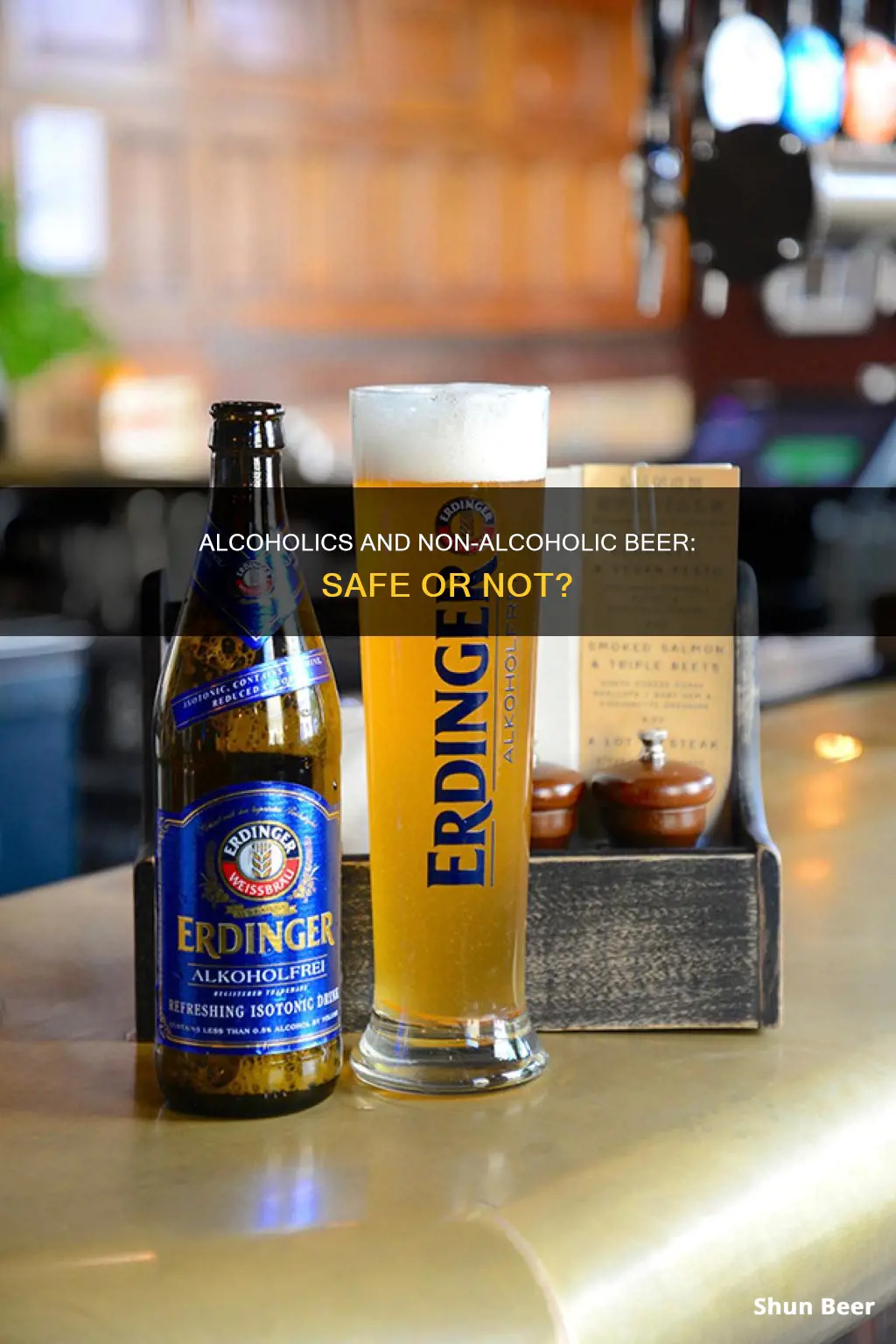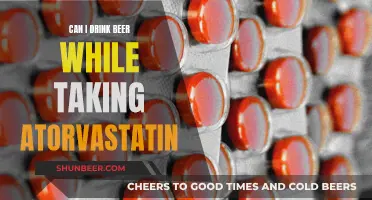
Non-alcoholic beer has gained popularity in recent years, with sales surging by over 37% in the USA in 2020. But is it safe for alcoholics to consume? According to federal law, for a drink to be considered non-alcoholic, it must contain less than 0.5% alcohol by volume (ABV). While it's almost impossible to get drunk on non-alcoholic beer, it can still be a powerful trigger for recovering alcoholics, potentially leading to cravings and relapse. The sensory experience of drinking beer, even without the intoxicating effect, can be a significant trigger, causing frustration and a condition known as euphoric recall, where the positive aspects of drinking are remembered while the negative consequences are ignored. While some people view non-alcoholic beer as a valuable alternative for those looking to moderate their alcohol intake, others believe it poses a dangerous loophole for those not fully committed to sobriety. So, can an alcoholic drink non-alcoholic beer? The answer may vary depending on the individual's recovery journey and their ability to recognize and manage triggers.
Can an Alcoholic Drink Non-Alcoholic Beer?
| Characteristics | Values |
|---|---|
| Federal Law ABV Limit | 0.5% ABV or less |
| ABV in Regular Beer | 5% or higher |
| ABV in Non-Alcoholic Beer | 0.05% |
| Intoxication Possible? | No |
| Triggers Cravings? | Yes |
| Triggers "Euphoric Recall"? | Yes |
| Serves as a "Behavioral Crutch"? | Yes |
| Alternative Options | Water, soft drinks, mocktails |
What You'll Learn

Non-alcoholic beer can trigger a relapse
Non-alcoholic beer is not completely alcohol-free. In the US, for a drink to be considered non-alcoholic, it must contain 0.5% or less of alcohol by volume (ABV). This means that non-alcoholic beer can contain up to 0.5% ABV, and some non-alcoholic beers contain even more alcohol than that. While it is very unlikely that drinking non-alcoholic beer will lead to intoxication, the small amount of alcohol it contains can still be a problem for people in recovery from alcohol addiction.
Triggers and cravings
The look, smell, and taste of non-alcoholic beer are almost identical to those of regular beer. Experiencing these sensory cues can trigger a relapse in people recovering from alcohol addiction. The sensory experience of drinking beer can cause "euphoric recall", a form of selective memory in which a recovering addict glamorizes their past drinking while ignoring the negative effects it had on their life. This can lead to intense cravings for alcohol and set the stage for a relapse.
A slippery slope
Even if a non-alcoholic beer does not trigger cravings or cause a relapse, it can still be a problem for people in recovery from alcohol addiction. Drinking non-alcoholic beer can act as a "behavioural crutch", allowing people to avoid dealing with the underlying issues that led to their addiction. Instead of creating new habits and finding alternative ways to cope with triggers, they are relying on a substitute for alcohol that still contains a small amount of alcohol. This can be a slippery slope that leads back to active drinking.
Endorphin release
Although non-alcoholic beer cannot get you drunk, it can still trigger the release of endorphins, the "feel-good" chemicals in your brain. For someone with a history of alcohol abuse, this can be enough to trigger a desire for more drinks and potentially lead to a full-blown relapse.
Individual differences
It is important to note that the impact of non-alcoholic beer on recovery from alcohol addiction can vary from person to person. Some people in recovery may find that non-alcoholic beer helps them feel included in social situations without compromising their sobriety. However, for others, the risks of triggering a relapse outweigh any potential benefits. It is crucial for individuals to be aware of their own triggers and make informed decisions about whether or not to consume non-alcoholic beer during their recovery journey.
Scotch and Beer: A Match Made in Heaven?
You may want to see also

It's impossible to get drunk on non-alcoholic beer
It is impossible to get drunk on non-alcoholic beer.
Non-alcoholic beer, sometimes called "near beer", is a brewed beverage that looks, smells, and tastes like beer but only contains trace amounts of alcohol. In the US, for a drink to be considered non-alcoholic, it must contain less than 0.5% alcohol by volume (ABV). In India, for a beer to be labelled non-alcoholic, the ABV must be 0.0%. Even non-alcoholic beers with 0.0% ABV may contain trace amounts of alcohol as a natural product of fermentation, but this is a negligible amount also found in some foods, like rye bread, bananas, and apple juice.
To put it into perspective, a regular beer has an ABV of 5-8%. You would need to drink 10 non-alcoholic beers to feel the effects of one regular beer. Non-alcoholic beer is metabolised quickly by the body, in about 17 minutes.
In 2012, a study was conducted in Germany to test blood alcohol levels after consuming non-alcoholic beer. After five days of abstinence from alcohol, 78 test participants were asked to drink 1.5 litres of non-alcoholic beer (0.41-0.42% ABV) within one hour. The maximum blood alcohol concentration found was 0.0056%. This indicates that even after consuming an extremely large amount of non-alcoholic beer, a person would not get drunk.
While non-alcoholic beer won't get you drunk, it can be a powerful trigger for recovering alcoholics, creating cravings that can lead to a relapse. The sensory experience of drinking beer, even without the intoxicating effects, can cause frustration and trigger a condition called euphoric recall, where a recovering addict glamorises their active addiction while ignoring the negative consequences.
Beer and H. Pylori: What You Need to Know
You may want to see also

The pros of non-alcoholic beer for alcoholics
For many alcoholics, the thought of never drinking again is a discouraging prospect, and they may be reluctant to commit to total abstinence. Non-alcoholic (NA) beer provides a valuable alternative for those looking to moderate their alcohol intake. NA beer allows them to occasionally enjoy a drink while still keeping sobriety an attainable goal.
The most challenging part of recovery for many alcoholics is the feeling of isolation when in social situations. Not being able to have a drink with dinner or when hanging out with friends can make them feel awkward, excluded, and different from their peers. NA beer gives recovering alcoholics the ability to blend in and feel included in situations that inevitably involve drinking, without compromising their sobriety.
NA beer also offers health and relaxation benefits. These beverages are far more organic and wholesome than full-alcohol beers, generally made from only four natural ingredients – water, yeast, malt, and hops – with barely any preservatives or added sugars. They can help people relax and unwind in stressful situations and aid insomnia, without the negative consequences of drinking alcohol.
NA beer has a very low alcohol concentration, about 1/10th that of regular beer, so it is virtually impossible to get drunk on it. This means that recovering alcoholics can enjoy the soothing qualities of alcohol without the risk of intoxication and its associated problems, such as reckless behaviour, impaired judgement, or blackouts.
Finally, NA beer can act as a stepping stone to ultimate sobriety. For some, the idea of never drinking again is so daunting that they don't even attempt to quit. Alcohol substitutes and low-alcohol beverages allow them to begin restricting their drinking and addressing their addiction. Some people find this approach attainable and rewarding, and it can lead them to choose total abstinence in the long term.
Exploring Beer Drinking Rules in National Parks
You may want to see also

The cons of non-alcoholic beer for alcoholics
Non-alcoholic beer is not completely alcohol-free. While it will not get you drunk, it can still contain up to 0.5% alcohol by volume (ABV) and thus, can be a powerful trigger for recovering alcoholics. The small amount of alcohol can be enough to pave the way for rationalizing having a stronger drink, leading to a full-blown relapse. The sensory experience of non-alcoholic beer—its look, smell, and taste—can be a significant trigger for someone in early recovery, as it is virtually indistinguishable from regular beer. This can cause "euphoric recall", where a recovering alcoholic romanticizes their past drinking and ignores the negative consequences, potentially leading to poor decisions and relapse.
Non-alcoholic beer can also serve as a behavioral crutch, providing a loophole for those not fully committed to sobriety. It can hinder the process of creating new habits, meeting new people, and developing hobbies that do not revolve around drinking. The desire to drink non-alcoholic beer may indicate a lack of dedication to recovery and a failure to address the underlying reasons for substance abuse.
Additionally, a recent study found that 30% of non-alcoholic beverages had ethanol levels higher than declared on the label, with some reaching up to 1.8% ABV. Consuming a large quantity of these drinks could potentially lead to intoxication, especially for those with a lower alcohol tolerance.
For these reasons, it is generally recommended that recovering alcoholics avoid non-alcoholic beer and opt for truly non-alcoholic beverages such as water, soda, or juice.
Exploring Salt Springs Recreation Area with a Beer
You may want to see also

The dangers of non-alcoholic beer for recovering alcoholics
Non-alcoholic beer is a popular alternative for those looking to cut down on their alcohol consumption. However, for recovering alcoholics, there are several dangers and risks associated with consuming non-alcoholic beer.
It still contains alcohol
Non-alcoholic beer is not completely free of alcohol. According to federal law in the US, for a drink to be considered non-alcoholic, it must contain less than 0.5% alcohol by volume (ABV). While this is a very small amount, it is still alcohol, and for someone in recovery from alcoholism, even these trace amounts can be triggering. Additionally, studies have shown that up to 30% of non-alcoholic beers exceed the 0.5% ABV limit, with some reaching up to 1.8% ABV.
Sensory triggers
The look, smell, and taste of non-alcoholic beer are virtually indistinguishable from regular beer. This sensory experience can be a powerful trigger for recovering alcoholics, evoking memories of drinking and triggering cravings. The sensory cues of non-alcoholic beer can lead to a phenomenon known as "euphoric recall," where a recovering addict glamorizes their past drinking and ignores the negative consequences of their addiction.
Behavioral crutch
Recovering from alcoholism requires establishing new habits, hobbies, friendships, and behaviours that do not involve drinking. Consuming non-alcoholic beer can become a behavioural crutch, allowing recovering alcoholics to fall back into old habits and environments that may trigger a relapse. Instead, it is recommended that they explore new activities, meet new people, and choose non-alcoholic alternatives such as water or soft drinks.
Endorphin release
Even though non-alcoholic beer has a low ABV, it can still trigger the release of endorphins, the "feel-good" chemicals in the brain. For someone with a history of alcohol abuse, this release of endorphins may be enough to trigger a craving for more, leading to a full-blown relapse.
Individual experiences vary
The effects of non-alcoholic beer on recovering alcoholics can vary from person to person. While some may find it helpful in easing social situations, others may find it triggering and a potential threat to their sobriety. It is important for individuals to be aware of their own triggers and make informed decisions about whether the benefits of consuming non-alcoholic beer outweigh the risks.
Beer and Amnesteem: Is It Safe to Drink Alcohol?
You may want to see also
Frequently asked questions
Non-alcoholic beer is a brewed beverage that is modelled after craft beers. It looks, smells, and tastes like beer, but only contains a maximum of 0.5% alcohol by volume (ABV) in the US.
There is no definitive answer to this question. While non-alcoholic beer cannot get you drunk, it can trigger cravings and lead to a relapse. It is important for individuals to recognise and deal with potential triggers and make an informed decision based on their recovery journey.
Non-alcoholic beer can act as a powerful trigger for recovering alcoholics, creating cravings and increasing the risk of a relapse. The look, smell, and taste of non-alcoholic beer can be significant triggers, leading to a condition known as "euphoric recall", where the positive aspects of drinking are remembered while the negative consequences are ignored.
Non-alcoholic beer can provide a valuable alternative for people looking to moderate their alcohol intake and can help them feel included in social situations. It also allows them to enjoy the flavour and sensation of beer without compromising their sobriety.
Alternatives to non-alcoholic beer include water, soft drinks, and mocktails. Mocktails, in particular, have become increasingly popular and provide a wide range of options for those looking for non-alcoholic alternatives.







